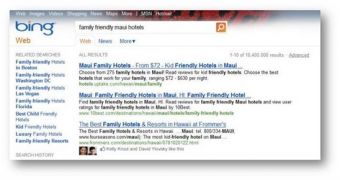Microsoft is finally taking advantage of the privileged position it has with Facebook and is starting to use data from the social network to improve and enhance search results. The new integration brings Facebook Like button data to the search page and also taps into your social graph for personalized results.
"Today, Bing is bringing the collective IQ of the Web together with the opinions of the people you trust most, to bring the 'Friend Effect' to search," Microsoft VP Yusuf Mehdi announced.
"Starting today, you can receive personalized search results based on the opinions of your friends by simply signing into Facebook. New features make it easier to see what your Facebook friends 'like' across the Web, incorporate the collective know-how of the Web into your search results, and begin adding a more conversational aspect to your searches," he explained.
One of the most obvious additions is Like button data. If one of your friends "liked" a page that surfaces in the search results, this will be displayed below the regular result box.
But Bing will also alter the search ranking based on your and your friends' interests as listed on Facebook or gathered from the Like data. This means that results will be personalized to bring forward sites that your friends trust, even if they don't rank as well normally.
Social data has been a great, untapped resource for search for quite some time now, and Facebook is probably the biggest source of such data.
Making use of it to improve search results, is a no-brainer, and Bing results should be better with it. But the move is also a strategic one since it's something that Google can't offer.
Google has integrated Social Search into the main search engine and it taps into a variety of sources to return results that have been 'promoted' or trusted by your friends and contacts on various social sites.
But Google doesn't have access to much of Facebook's data, like Bing does. Arguably, the Like button data also counters the experimental +1 button introduced to Google Search.
While Google has to get users to click on the button, which will be deployed for third-party websites soon, to start amassing data, the Facebook Like button is already widespread.
Google has an uphill battle in this area and Bing has a big advantage. Considering the tense relationship between Facebook and Google, this is unlikely to change any time soon.
But, how this will evolve depends on two main things, on the one hand, whether Bing manages to turn the Facebook data into a practical and obvious advantage, on the other, whether Google manages to build up a set of social tools to compete, at least to some degree, with Facebook.

 14 DAY TRIAL //
14 DAY TRIAL //